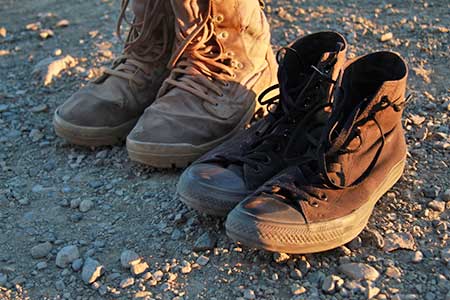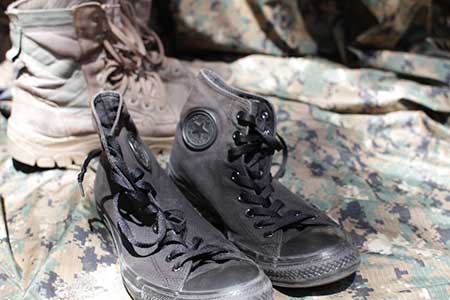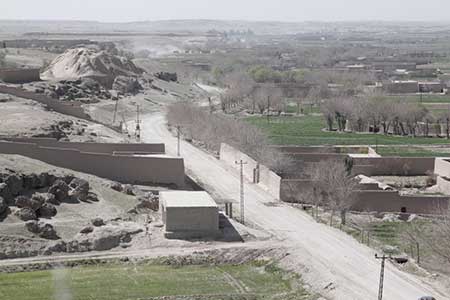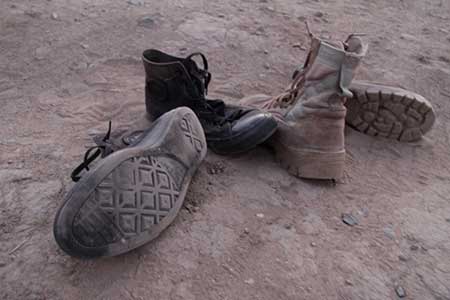
Combat boots and a pair of high top chucks.
This is a short series of vignettes written by Patrick O’Neill about his service in Afghanistan as a Reconnaissance Marine in the United States Marine Corps from 2007-2011. He was deployed twice as a member of six-man reconnaissance team with 2D Recon Battalion, Alpha Company in support of combat operations in Helmand Province Afghanistan. The vignettes provide an inside look at the rigors of living in a combat zone, participating in military operations, and dealing with the consequences of daily life and death situations.
One of the most difficult things about serving in the military thousands of miles from home is missing the many things we take for granted here in America. Often a simple object or item of clothing helps that solider cope. In Mr. O’Neill’s case, it was his pair of chucks. On this website we have often stated that wearing a pair of chucks represents freedom. These vignettes point that out quite vididly.
I was kneeling in mud, pressing my cheek against my thigh as the medevac helicopter disappeared into the night sky, taking another Marine from that place. The echoing blades subsided as we stood, continuing our trek across an unfriendly desert back to the patrol base (PB). Without a doubt the Taliban knew our location now. The night was growing colder as we approached the river, and ahead the gasping from desperate men sliding into water was unmistakable.
Instantly, everything below my neck was submerged and frozen including my ammunition pouches as I instinctively thrust the gun over my Kevlar helmet. The fields on the opposite bank were mudded from irrigation, and pulling my suctioned boot from the muck, the weight of my gear sent me right into it. I rolled to my back and then couldn’t move. Shadows from the Afghan village became their faces in my helpless eyes. The platoon stopped. I hated the whole platoon slowing for me. I grabbed Lee’s glove in front of my face and we continued. Soon the sun would rise. I thought of the others, tried to think of the mission, the numbness in my boots, anything, but only thought of my two brothers who would not see the sun.

Combat boots and a pair of high top chucks.
At the PB the rest of the company greeted us with water. It had been three days. My mudded machine gun, dripping ruck, vest, bullets, grenades and boots I set along the wall of that abandoned Afghan compound. In the corner beside my sleeping bag lay my pair of beautiful, dry, Chuck Taylors. I quickly traded them for my damp boots. My feet instantly regained sensation inside of those glorious chucks. Outside the dark room as the sun came up I sat, wrapping my arm around Lee who was shaking and attempting to build a fire with cardboard, while still clinching his rifle tightly.
It was called “Alcatraz,” our sanctuary for a seven month trip. It was really only two mud squares on a hill in a desert. But it had walls big enough to house the whole company, three platoons. The valley was below. If we were not patrolling the valley we were above at Alcatraz, and had trucks on all corners manned and armed. We got by the best we could.
My poncho was hanging diagonally by empty cartridges hammered into the clay wall, and I was asleep beneath the poncho on the ground, until my Team Leader’s boot woke me. The time had come again to follow my platoon down the wadi to the road, where a pack of Afghan elders were waiting to talk. My Lieutenant was standing there with the interpreters, while I readied the machine-gun on its bipods and TJ did the same with his scoped rifle. The bullets came in snapping against the rock. My neck muscles clinched closely to the butt-stock of my weapon. The cowardly attack by the Taliban was another routine message, probably threatening the elders for meeting with Marines. Before I could send a burst in reply, it was over. It was too early for this shit again, I thought hiking back up to Alcatraz.

These chucks adapted well to rigorous exercise and desert temperatures.
The temperature had risen above a hundred by noon, but I needed to work off some frustration. I stripped off my gear, laid the weapon on the wall and slipped into my chucks. I borrowed my buddy’s heavy lead kettle bell, and carried it to some open sand to sweat it all out in peace. Swinging the weight above my head, squatting, pressing it over my shoulders or just throwing it, my Chuck Taylors adapted well to rigorous exercise and desert temperatures. Already soaking in sweat, I set off to run around the perimeter of mud walls, past the gun trucks and sharp wire, and around the sand berms that protect us from incoming fire. In those days, my chucks kept me on my feet, and cleared my head. I got by the best I could.
It was night once more, and out here in Afghanistan the night is for work. On the edge of my olive-drab cot, stained in white lines of sweat, I sat hunched over my ruck filling it to the brim with bottled water, ammunition, socks, food, mission essential equipment and lastly my Chuck Taylors. The patrol would be leaving for three days in 40 mikes. [NATO term for minutes]
We entered the city in a clandestine movement searching out the target building amongst the backdrop of farmed plots, blind walls and canals. We always hoped to enter quietly without firing shots, take control of it, establish it as a defensive position and brace the inevitable Taliban attack at sunrise. I walked slowly, sniffing the air, an important sense that would often remind me of our position in that unfriendly place.

Afghan village.
We encircled the objective compound in preparation—it had become routine though rou-tines in Helmand Province can be compromised abruptly. In a swift wave of pointed rifles we took it, detained its suspected Taliban inhabitants, positioned security on corners and investigated the scene. Hours passed as we finished fortifying firing spots with sand bags. Then, Lee and I climbed up on the hardened dirt rooftop, and got comfortable for our two hours anxiously, nervously, awaiting sunrise when the enemy would discover the presence of a Marine Recon platoon in their backyard. I couldn’t keep my boots dry on a single damn patrol, because of the irrigation; which made the rooftop seem less comfortable by the minute. Lee reminded me, quietly, that we’d be here for another two nights. He was wise setting his boots to dry by his ruck overnight in exchange for those cheap USMC flip-flops.
“Don’t tell me you forgot to pack those Chuck Taylors, Paddy?” Lee whispered, tilting his night vision to look at me.
“Of course I have my chucks, the problem is they’re not on my feet.”
He laughed condescendingly. “Climb down and grab ‘em, then get your ass back up here.”
Lee had his forearms on the sand bags and was staring into the thermo-imaging things when I returned. “All good?” I asked, lying next to him behind the sand bags, while I pulled off a wet sock.
“Yeah, just a loose dog.”
Under the stars, the boots sat with my gross socks spread across the laces, and the chucks were finally on my feet purposefully untied. The attack would come at sunrise, of that we were sure. The objective compound for which we now held was in the Northwest sector by the river, known to be held by Taliban, and they would want it back. My feet had dried, just prior to sunrise, and we were wide-awake and ready. A foremost important thing any young Marine will be told, is to take care of his feet and change-out socks whenever possible, so that’s what I did that night and for many more. Enduring a long morning of combat is more bearable when your feet are comfortable and dry. At sunrise, immediately after the prayer speakers cut-off, the attack came.
I opened my eyelids reluctantly to the first color being, as usual, the white and sanded inside of the tent ceiling, which was glowing from the powerful desert sun. And after a stretch, I sat up and reached below the cot for my pair of monochrome high top chucks. Others in the platoon passed by carrying machine gun ammo—I slipped into my chucks quickly to catch up with them, as usual. I climbed up the back of the Humvee wearing nothing other than my chucks and shorts and fixed up the gun for the convoy that night. The ammo was loaded, gun readied and cleaned, and all before breakfast. As usual, again, I knew my place would be behind that gun for the night’s convoy far-off into the desert, which was exactly where I wanted to be.
It was dusk, the best time of day in the Afghan summer when the merciless sun subsides, and as usual, before departing, my brothers and I sat atop Humvees, some with cigarettes between fingers, while others were sipping the weird Middle Eastern orange pop, the name written in characters on the can which none could read, listening to the sounds of Iron Maiden, CCR, Zeppelin and the rest of the “pre-war” playlist as we called it. This usual routine acted as both relaxation and motivation to keep our minds away from the hazards we all had witnessed on previous missions.

Monochrome black high top chucks and combat boots on the ground.
There in our T-shirts, shorts, flip-flops or in my case, Chuck Taylors, we would joke and then at times we spoke more seriously about everything on our minds—things that needed to be said. It was those times that I cherished the most out of necessity in sharing the experience with each other. Ah yes, we paced back-and-forth many nights like that always in flip-flops, chucks or whatever was more comfortable than the boots we lived in, we paced along the line of armored trucks and guns with music playing softly in the background, comforted with the knowledge that we were all there together. It was the seemingly mundane, usual times, with those brothers pacing back-and-forth in flip-flops and my chucks that remain with me about the war as vividly as the moments when bullets flew by or explosions rained dirt and dust in our faces that I remember most.